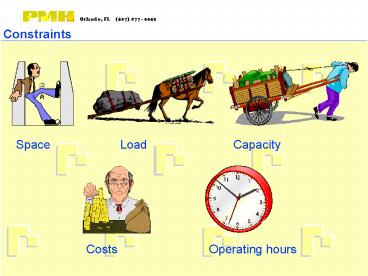AGV-Presentation - PowerPoint PPT Presentation
Title:
AGV-Presentation
Description:
Space Capacity Load Costs Operating hours Advantages of an automated guided vehicle system Clear floorspace No floor deck construction Simple installation High ... – PowerPoint PPT presentation
Number of Views:820
Avg rating:3.0/5.0
Title: AGV-Presentation
1
Constraints
Space
Capacity
Load
Costs
Operating hours
2
Transport solutions
3
Advantages of an automated guided vehicle system
- Clear floorspace
- No floor deck construction
- Simple installation
- High availability/reliability
- Flexible performance increments
- Short installation times
- Simple expansion
4
Cost-effectiveness considerations
Manned Automated forklift Transport
(typical) Investment cost 100 400 Manning
costs 100 5 Maintenance 100 200 Transport
damage 100 5
Single shift
Two shift
Three shift
Stacker
Stacker
Investment
Investment
Stacker
Investment
AGV
AGV
AGV
Years
Years
Years
5
Optimal integration into your operating
environment
6
The automated guided vehicle (AGV) system
1 Automated guided vehicle (AGV) 2 Load
transfer positions 3 Load handling equipment 4
Load devices 5 Guide track (laser,
inductive, optical) 6 Data transmission 7
Management system
7
Application areas and load handling variations
Distribution Warehousing Manufacturing Assembly
Fork lift trucks
Lift table
Transverse forks
Rollers
Hospitals Assembly lines Store operation
8
Vehicle types
9
Vehicle functions
- Data exchange
- Infrared
- Radio
- Man / vehicle functions
- Inputs made via operator panel with its keyboard
and display - Destination input to the vehicle
- Plug-in manual control and diagnosis module
- Special functions
- Battery reserve monitoring
- Control of battery charging
- Obstacle recognition
- Route (destination) finding
- High vehicle intelligence
- Travel route topology stored in the vehicle
- Destination code processing
- Load-sensing and empty location recognition
- Load handling
- Load acceptance
- Load depositing
- Load monitoring
- Load transfer synchronization
- Guide track following
- Guided movements using
- optical track
- inductive track
- "free-flight" (partly guide-trackless)
- "free-navigation" (guide-trackless
- Travel control
- Speed
- Safety gap maintenance
- Collision protection
10
Safety elements
Audible signal
Flasher
Emergency stop
Protective bar
Status indicator
Photobarrier
Obstacle sensor
Protective bar
Side protection rails
11
Control concept
PHS management computer
Visualization
Modem
Terminal
Log printer
Peripheral devices
12
AGV task allocation
PHS management computer
HOST
AGVs
Customer
Control centre
Transport request
Transport order
13
AGV task allocation
Collection point (source)
Destination
'from' / 'to' order Vehicle knows the street
network (layout)
Current location
Crossing management
14
Use of the drive batteries
Cyclic operation (for 24 hours operation)
Operation from reserves (with interim
recharging (for 8-16 hours operation)
Operation from reserves (for 8-14 hours)
15
Project implementation phases
FUNCTIONAL ACCEPTANCE 2 by customer on site
Performance and availability test
FUNCTIONAL ACCEPTANCE 1 by customer at PMH
Acceptance of subcon- tracted items
Quote request Order placing Subcontracting
PMH know-how
Engineering design of subsystems
Long-term test of individual components
Assembly Commis- sioning
Manufacture
Vehicle test
Order specification
Install software
Integration with application software
Modify standard software
System design
Design Software
Trial runs
Needs
Constraints
Programming application software
Testing application software
Quality assurance
Technical training
Joint work comms'g
Joint work testing
Technical training
Monitoring of the trial runs
Customer training
16
Professional project management
Customer
Sales
Engineering
Planning and simulation
Software/ control system
Project management
Market
Technical
System- configuration
AGV
Responsibility for - functionality - delivery
date - costs
Production/ commissioning
Subcontractors
17
PMH-Service
Customer service
Spare parts service
Maintenance
Assistance
Remedial maintenance
Program maintenance
Full maintenance
Remote maintenance
On call intervention
Periodic
On-site team































